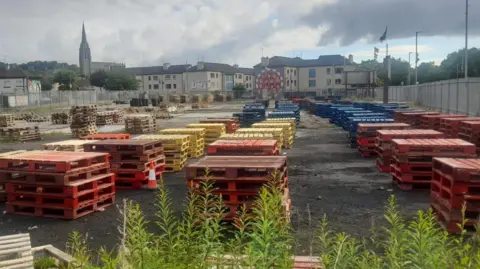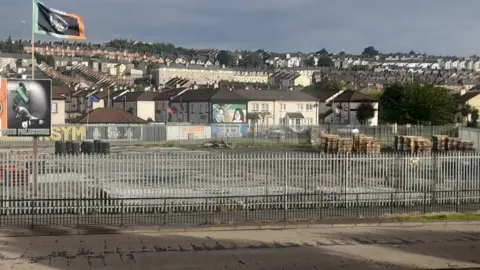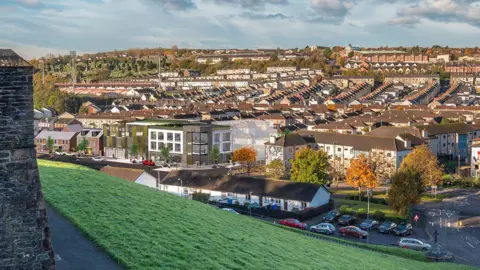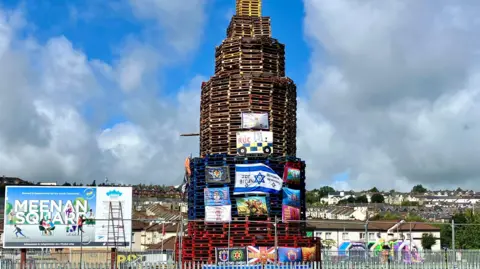Contractors 'unwilling' to remove bonfire material
 BBC
BBCA housing association in Northern Ireland has said it cannot find a contractor willing to remove bonfire material from a site earmarked for multimillion-pound redevelopment.
Apex Housing said enabling works for the £11m redevelopment of Meenan Square in Londonderry's Bogside had been due to start within weeks.
But that cannot happen until it finds a firm willing to remove the material currently stored on the derelict site, where bonfires have led to trouble in previous years.
"We have explored all available options to remove bonfire materials from the site; however, no contractor has been willing to undertake the work due to significant health and safety concerns," a spokesperson said.

The initial works on the site, Apex said, had been due to get under way in early June.
"But due to the ongoing unauthorised activity and associated safety risks, these works will be delayed unless the site can be cleared and safely accessed," Apex told BBC Radio Foyle's Twenty Minutes with Mark Patterson.
Apex submitted a full planning application for the site, which it owns, in February for a development that includes housing, retail, office and other commercial space.
Previous bonfires in Meenan Square have attracted some criticism in recent years.
Apex could also not source a contractor in 2024 to remove materials in the run-up to the bonfire.
It said it was continuing work this year "to find a resolution that prioritises the safety and wellbeing of the local community."
 Apex Housing Association
Apex Housing AssociationSDLP MLA Sinead McLaughlin said she understood Apex's concerns which, she said, had left her disappointed.
"The enabling works which were basically due to start next week are now being delayed – that will push back the development process," she said.
"We want to see this site regenerated and for the proud people that live in the region of the Bogside to have what they deserve in the midst of their community."
She said the majority of people in the community did not want a bonfire on the site and a resolution was needed urgently.
'Forced entry'
Apex said work to repair the site's boundary fences was currently ongoing following "repeated incidents of forced entry".
A spokesperson said it was "committed to progressing with the planned development as soon as possible."
Stormont's Executive Office (TEO) is working with Apex on the redevelopment project.
BBC News NI has contacted TEO for comment.
In a statement, the Police Service of Northern Ireland (PSNI) said they recognised the cultural significance of bonfires in some communities across Northern Ireland, while also acknowledging the concerns they may raise.
They said they worked closely with councils, statutory bodies, community representatives and landowners to "address community safety issues" related to bonfires.
"Where criminal offences, such as the suspected theft of pallets, are identified, police may seize materials as part of ongoing enquiries," they said.
"While we do not comment on individual security matters, we take all potential risks to individuals seriously and act accordingly."

Why is the bonfire being lit?
Bonfires on 15 August are traditional in some nationalist parts of Northern Ireland to mark the Catholic Feast of the Assumption.
Some bonfires are also lit in nationalist areas in August to commemorate the introduction of internment without trial of republican suspects, which was introduced by the government in 1971.
Last year police said they were treating the display of flags and banners - including union flags, a King Charles coronation flag and the flag of Israel - on the bonfire as a hate crime.
The names of US President Joe Biden and Israeli Prime Minister Benjamin Netanyahu were also written on that flag next to a swastika and crosshair.
The police investigated shots being fired near the site in 2022 and also investigated reports of political material - including flags and poppy wreaths - being placed on the bonfire as potential hate crimes.
Posters placed on the bonfire in 2021 referenced former Police Service of Northern Ireland (PSNI) Chief Constable Simon Byrne and one referred to the murder of Catholic police officer Ronan Kerr.
Mr Kerr was killed when dissident republicans fitted a booby-trapped bomb to his car in Omagh, County Tyrone, in 2011.
